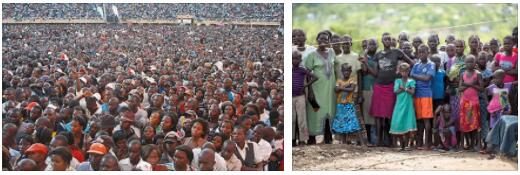Togo French-language Literature
Since Togo was a land where the Germans had fought for power against the French and English without taking into account the ancient African languages and cultures, most natives who received education had fairly casual knowledge of European languages. Although several European languages were used in Togo, French has become the dominant literary language. But the first Togo writers had trouble getting noticed in their home country, both because their own language level was often uneven and because there were relatively few competent readers in their country. It was therefore a common belief for a long time that the literary tradition in Togo did not originate until the 1980s. In recent years, however, it has become clear that the French-language literature in the country has its roots back to the interwar period.
Félix Couchoro (1900–68) is considered the first French-speaking author from Togo. He published a number of books, but is best known for his debut novel L’esclave (“The Slave”) of 1929, which is considered among the first literary texts from French-language Africa. Of his books may otherwise be mentioned L’héritage, cette plague (1963, “The heritage, this torment”). Couchoro, who was educated at a Catholic school and later worked as a teacher at the same school, was strongly influenced by Christian beliefs. He was critical of many communities in Togo, but did not oppose European influence in the country.
David Ananou (1917–2000) continues the tradition from Couchoro. His novel Le fils du fétiche (1955, “The Son of Fetish”) is an attack on the cultivation of fetishes and other superstitions. In the book you meet a father who clings to the superstition and his son who wants to free himself from it. Like much of the literature of French-speaking Africa, the book is also marked by ideals from the literature of French classicism, and especially by comedy writer Molière.
In the next generation you will find more writers and greater variety in terms of themes and approaches: Victor Aladji (born 1941) is best known for the novel Akossiwa mon amour (1971, “Akossiwa my beloved”) in which an older man remembers adolescence and his first love. The following year he published the short novel L’equilibriste (“The Acrobat”) in which the protagonists are a group of young people who have lost the hopes and illusions that liberation first created in them. The action takes place in a fictitious African country, but no reader has any doubt that it is the Togo author has in mind.
One of the most prominent authors of Togo is Yves – Emmanuel Dogbé (1939–2004). He has published novels, short prose and lyricism and also made selections of the country’s poetry. His first novel is La Victime (“The Victim”) from 1979, but his best known novel is L’incarcéré (“ The Prisoner”) which came out the following year. Among his other novels are Le Miroir (“The Mirror”) from 1995. Dogbé has founded a publishing company that has published many authors both from Togo and from the rest of Black Africa. In 2002, he was awarded “Black Africa’s Great Literary Award” for his authorship as a whole.
A writer from Togo who has become particularly well known in Scandinavia is Tété – Michel Kpomassie (born 1941). He traveled to Northern Europe and lived for 16 months among the Inuit in Greenland. His book L’Africain du Groenland was published in 1980 and appeared in Norwegian translation in 2004 (“An African in Greenland”). Kpomassie has not written other books, but has published short stories and essays in African journals.
Emile Koffi Gomez (born 1941) is best known for the novel Opération Marigot (1982 “The Flood Operation”), which is about “the green revolution” initiated by the rulers in the countryside in the 1970s. Among his other books is L’argent, cette peste (1983, “The Money, This Torment”), where the title refers to Félix Couchoro’s famous book. He has also written a historical novel and several books for children.
Julien Atsou Guenou (born 1950) has written several novels that convey his own experiences as a disabled person. His best-known book is Le bonheur à l’arrache (1983, “Happiness in a Strength of Power“). Guenou is concerned, among other things, that Togo’s desire to be independent of European influence prevents the country from receiving the fruits of modern European science, for example in medicine.
One of the first lyricists of Togo was Gnoussira Analla (born 1954). His lyrics are characterized by poetic play, and his wordplay and linguistic imagination have often been compared to French lyricist Jacques Prévert. His best-known collection of poems is Morte saison (1992 “Silent Season”).
Pedro Santos Anoumou is considered the first playwright from Togo. His life and work are little known, but in 1956 he got the comedy Fasi. The theme is well known: The parents want to marry their daughter to a rich, old man, but her daughter and boyfriend are rebelling against these plans. You don’t know much about Modeste d’Almeida and Gilbert Laclé either, but together they have written several plays that have made good fortune in Togo. Particularly famous is Kétéyouli, l’étudiant noir (1967, “Kétéyouli, the Black Student”) about the young man who leaves his environment and heartbreak for the benefit of exciting experiences in Paris. But here too the story ends well, because the enlightened village chief brings the young people back together in the end.
Sénouvo Agbota Zinsou (born 1946) is both a writer and a staging artist and has done a lot for the development of theater in the country. His plays have been constantly performed in both Africa and France. But he is probably best known for his humorous and satirical tales, including Yévi et l’éléphant chanteur (2000, “Yévi and the Singing Elephant”). Zinsou had to emigrate to Germany for political reasons, but his pieces are still listed in his home country.
Sadamba Tcha-Koura (born 1960) is a trained social anthropologist and noted with bold analyzes of modern metropolitan life, partly in Africa, but primarily in Latin America. But he eventually went on to write novels under the pseudonym Sami Tchak. In particular, Le Paradis des chiots (2006, “The Puppies’ Paradise”) has received great attention both in content and form. This is a polyphonic novel with multiple narrators and with stories intertwined. Sami Tchak’s portrayals of people who only barely manage to give themselves a dignified life have received literary honors in both Africa and France.
Togo does not have many female writers, and the few that exist have had their breakthroughs in the 1980s or even later. Christiane Akoua Ekué (born 1954) has, among other things, published a novel that has many features in common with the crime novel Le crime de la rue des notables (1989, “The crime in the stands of street people”). It tells of a female writer who gets stolen from her screenplay. Germaine Kouméalo Anaté (born 1968) has published poetry collections and short stories as well as the novel Le regard de la source (2005, “The View of the Source”). Her style has been called intimate, and she especially deals with the man-woman relationship.
Several of French-language Africa’s most prominent young writers were born in Togo, but they have often emigrated, mainly to France. Kossi Efoui (born 1962) debuted as a playwright and had some of her plays performed on famous scenes in France. But it is as a novelist he has attracted attention. His first novel La Polka (“The Polka”) of 1998 gained recognition, but La fabrique des cérémonies (2001, “The Ceremony Factory”) became his major breakthrough. This book was awarded with “Black Africa’s Great Literary Award”. The novel Solo d’un revenant (2009, “A Gangster Solo Song”) has also been honored with several awards. In Efoui’s novels, many different themes are woven together. They are sometimes perceived as parodies of travel novels, and the protagonists often return to places they have previously been associated with, but which have now been completely transformed. Efoui is strongly critical of the political development of Togo and he is also alien to la négritude and similar literary ideals that modern African literature is often characterized by.
In 2003, “Black Africa’s Great Literary Award” again went to a writer from Togo. Kangni Alem (born 1966), pseudonym of Kangni Alemdjrodo. The novel Cola Cola jazz (2002) is about two half-sisters, one of whom is black and the other white. Important themes in the book are the young women’s conflicting relationships with each other and their attempts to find out who their father is. In this way, their history also becomes a picture of the conflicts that characterized modern Africa. Alem has written books in a number of genres, including plays and short stories, and he also works as a translator and critic. In the same way as Efoui, Alem in his books combines the joy of formal play and experimentation with a deep grief over developments in Africa.
Also in 2006, “Black Africa’s Great Literary Award” went to a writer based in Togo. Edem Awumey was born in Togo in 1975, but emigrated to Canada in 2005. He was rewarded for the novel Port-Mélo (2006), a bleak depiction of violence and abuse of power in a fictional African country. The same pessimistic basic tone characterizes Awumey’s later books. The novel Les pieds sales (2009, “Dirty Feet”) is about a young African who works as a taxi driver in Paris and who has only a vague idea that as a little boy he walked through the desert with his parents and a camel. While other younger Togo writers like to reconcile the depiction of life’s deepest problems with humor, the grief is often taken over in Awumey’s stories.
Togo is a country where literary life has undergone a great development in recent years, and on the formal level, several of the authors have acquired techniques that are relevant in modern European literature. Almost all of the country’s young writers are men. It is therefore interesting to see that the main characters in their books are largely women and children, and that their helplessness in the face of terror and persecution is perhaps the most central theme of Togo’s latest literature.



